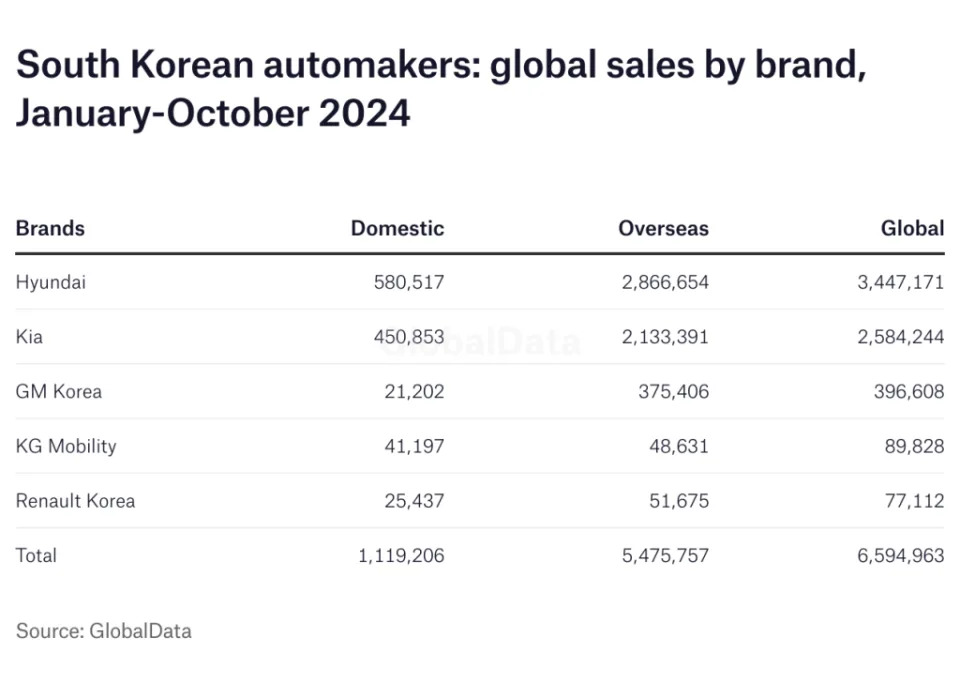Domestic sales by South Korea’s five main automakers combined increased by 6% to 123,810 units in October 2024 from 117,012 year earlier, according to preliminary data released individually by the manufacturers. The data do not include sales by South Korea’s low-volume commercial vehicle manufacturers including Tata-Daewoo and Edison Motors, while import brands are covered in a separate report later in the month.
The domestic market has improved significantly in the last few months, after a weak first half of year, with October’s volumes also 17% higher compared with sales in September. New launches of electrified models have helped drive up demand, while consumer sentiment has also been lifted the central bank’s 25 basis point interest rate cut in October. This was the first since 2020 and followed a sharp slowdown in GDP growth in the third quarter, to 1.5% year-on-year from 2.3% in the second quarter - which was well below expectations.
Cumulative ten-month domestic vehicle sales were down by over 7% at 1,119,206 units from 1,206,654 units a year earlier, with Hyundai’s sales declining also by more than 7% to 580,517 units while Kia’s sales fell by 5% to 450,853 units. GM Korea reported the sharpest decline year-to-date (YTD), of 37% to 21,202 units, while KG Mobility’s sales dropped by 25% to 41,197 units. Only Renault Korea reported a sales rise so far this year, of 37% to 25,437 units from very weak year earlier levels, helped by the recent launch of the new Grand Koleos SUV.

Global sales by the country’s “big-five” automakers, including vehicles produced overseas by Hyundai and Kia, fell by 1.3% to 6,594,963 units in the first ten months of the year from 6,681,359 in the same period of 2023, while overseas sales were slightly higher at 5,475,757 from 5,473,254 units.
Hyundai Motor ’s global sales fell by almost 2% to 371,421 units in October from 377,332 a year earlier, with a slight increase in domestic sales more than offset by lower overseas deliveries. The company also reported over 20,000 BEV sales globally last month. Total volumes in the first ten months of 2024 were also down by close to 2% at 3,447,170 from 3,504,368 previously.
Domestic sales increased slightly to 64,912 units in October from 64,328 a year earlier, including 10,655 Genesis-branded vehicles and 54,257 Hyundais – of which 22,812 were SUVs. Cumulative ten-month sales were still down by 7.5% at 580,517 from 627,847 units, reflecting weak sales in the first half of the year.
Overseas sales fell by just over 2% to 306,509 units in October from 313,004 a year earlier, while YTD volumes were just slightly lower at 2,866,654 units from 2,876,521 units - underpinned by strong demand in North and South America and in India earlier in the year.
Hyundai looks like it will struggle to achieve its goal of selling 4.24 million vehicles globally in 2024, including 704,000 domestic sales and 3.54 million overseas, despite a new EV plant scheduled to become operational in the US state of Georgia before the end of the year. In September the company also reduced its medium-term global sales forecast, by 6% to 5.5 million vehicles by 2030, to reflect the slower than expected global uptake in battery electric vehicles (BEVs) and rising competition from Chinese automakers in key global markets.
Hyundai began deliveries of its new Casper A-segment BEV in August and plans to introduce the Ioniq 3 and Ioniq 7 BEVs by the end of the year. The company also confirmed it will continue to “improve its regional product mix, optimize production and enhance its product mix with more SUVs and luxury models”.
Kia ’s global sales increased by almost 3% to 264,854 units in October 257,636 a year earlier, with domestic and overseas sales both higher. The Sportage SUV remained its best-selling model globally last month with 48,965 deliveries, followed by the Seltos with 25,608 sales and the Sorento with 23,101 units. Global sales in the first ten months of the year were still down by 1% at 2,584,244 units from 2,611,865 units.
Domestic sales increased by 7% to 46,025 units last month from 42,960 a year earlier, with the Sorento, Seltos and Carnival its best-selling models, but volumes were still down by 5% at 445,925 YTD from 468,835 units. The company reported a further 4,928 special-purpose vehicle (SPV) sales in this period, including military and municipal trucks, sold mostly in its home market.
Overseas sales increased by 2% to 217,901 units in October from 214,130 a year earlier, while cumulative ten-month volumes were just slightly lower at 2,133,391 units from 2,138,499 – with the Sportage and Seltos SUVs and the K3 sedan its best-selling overseas models.
Kia released the revamped K5 mid-sized sedan at the beginning of November and plans to launch the all-new Sportage and begin sales in Europe of its all-electric EV3 before the end of the year. Key new model launches scheduled for the first half of next year include the new battery-powered EV4, the K4 sedan and the Tasman pickup truck.
Earlier this year Kia said it aimed to sell 3.2 million vehicles globally in 2024, including 530,000 domestically, 2,663,000 overseas and a further 7,000 SPVs globally. The company’s medium-term plan is to sell 4.3 million vehicles annually by 2030, including 1.6 million BEVs.
GM Korea ’sglobal sales increased by 8% to 50,021 vehicles in October from 46,269 a year earlier, after plunging sharply in the third quarter due to a series of partial strikes. Full production resumed in early October after a wage agreement was reached with the company’s labour union. Sales in the first ten months of the year were just 7% higher at 396,608 units from 369,540, underpinned by strong gains in the first half of the year.
Local sales continued to fall sharply last month, by 56% to 1,974 units from 4,469 units a year earlier, while cumulative ten-month volumes were down by 37% at 21,202 units from 33,525 units – reflecting strong competition from Hyundai-Kia and from imports, as well as the recent production stoppages. The company produces two main models, the Trax Crossover and the Trailblazer SUV, and imports the Colorado pickup truck, Equinox, Traverse and Tahoe SUVs, as well as the GMC Denali pickup truck.
Exports increased by 15% to 48,047 units in October from 41,800 a year earlier and were up by 12% at 375,406 units YTD from 336,015 – reflecting strong overseas deliveries of the Trax Crossover vehicle in the first half of the year.
The company recently said it is targeting a 13% increase in full-year sales to 529,200 vehicles in 2024, with the company aiming to make up most of the production lost during the strikes in the fourth quarter of the year.
KG Mobility (KGM) reported a44% rebound in global sales to 9,245 vehicles in October from a depressed 6,421 units a year earlier, reflecting sharply higher overseas sales and an improvement in domestic deliveries. Total volumes in the first ten months of the year were still down by 13% at 89,828 from 102,640 units. The company, previously known as Ssangyong Motor, was acquired in late 2022 by a consortium led by local steel and chemicals firm KG Group.
Domestic sales increased by 18% to 4,504 vehicles last month from 3,804 units a year earlier, helped by the recent launch of the new Actyon SUV and a new minivan version of the Torres EVX SUV. Cumulative ten-month volumes were still down by 25% at 41,197 from 54,788 units, reflecting weak overall domestic demand and strong competition from other domestic manufacturers and importers.
Exports surged by 81% to 4,741 units in October from a depressed 2,617 units a year earlier, with the company reporting a jump in shipments of the Rexton Sports, Actyon and Torres SUVs to Turkey and Germany. Total exports in the first ten months of the year were up by just 2% at 48,631 units from 47,852 previously, with volumes held back by weak demand for BEVs in Europe.
Last month KGM announced it had signed a strategic partnership China’s Chery Automobile Company, involving platform licensing and product sharing aimed at helping it strengthen its SUV line-up. The deal will also give KGM access to readily available new energy vehicle (NEV) technologies including vehicle platforms.
Renault Korea ‘s global sales more than doubled to 12,456 vehicles in October from very weak 5,745 sales a year earlier, reflecting a strong surge in domestic deliveries as well as sharply higher overseas shipments. Total sales in the first ten months of the year were still down by 17% at 77,112 units from 92,946 units, however.
Domestic sales surged more than fourfold to 6,395 vehicles last month from 1,451 units a year earlier, following the recent launch of the new Geely-based Grand Koleos hybrid SUV, while YTD sales were up by 37% at 25,437 units from 17,128. The company also launched a gasoline version of the Grand Koleos last month.
Exports rebounded by 41% to 6,061 units in October from 4,294 units a year earlier, mostly comprising shipments of the Arkana hybrid crossover vehicle (a rebadged XM3), although YTD exports were still down by over 30% at 51,675 units from 74,367 units.
Earlier this year Renault Korea confirmed it will continue to overhaul its product range with a strong focus on SUVs, BEVs and hybrid vehicles, starting with the new Geely-based Grand Koleos hybrid SUV in July and the phasing out its aging SM6 mid-size sedan this year. The company recently agreed with Geely to produce the Polestar 4 BEV at its Busan plant from the second half of 2025, for sale domestically and for export.
"South Korea report: domestic market perks up" was originally created and published by Just Auto , a GlobalData owned brand.
The information on this site has been included in good faith for general informational purposes only. It is not intended to amount to advice on which you should rely, and we give no representation, warranty or guarantee, whether express or implied as to its accuracy or completeness. You must obtain professional or specialist advice before taking, or refraining from, any action on the basis of the content on our site.


